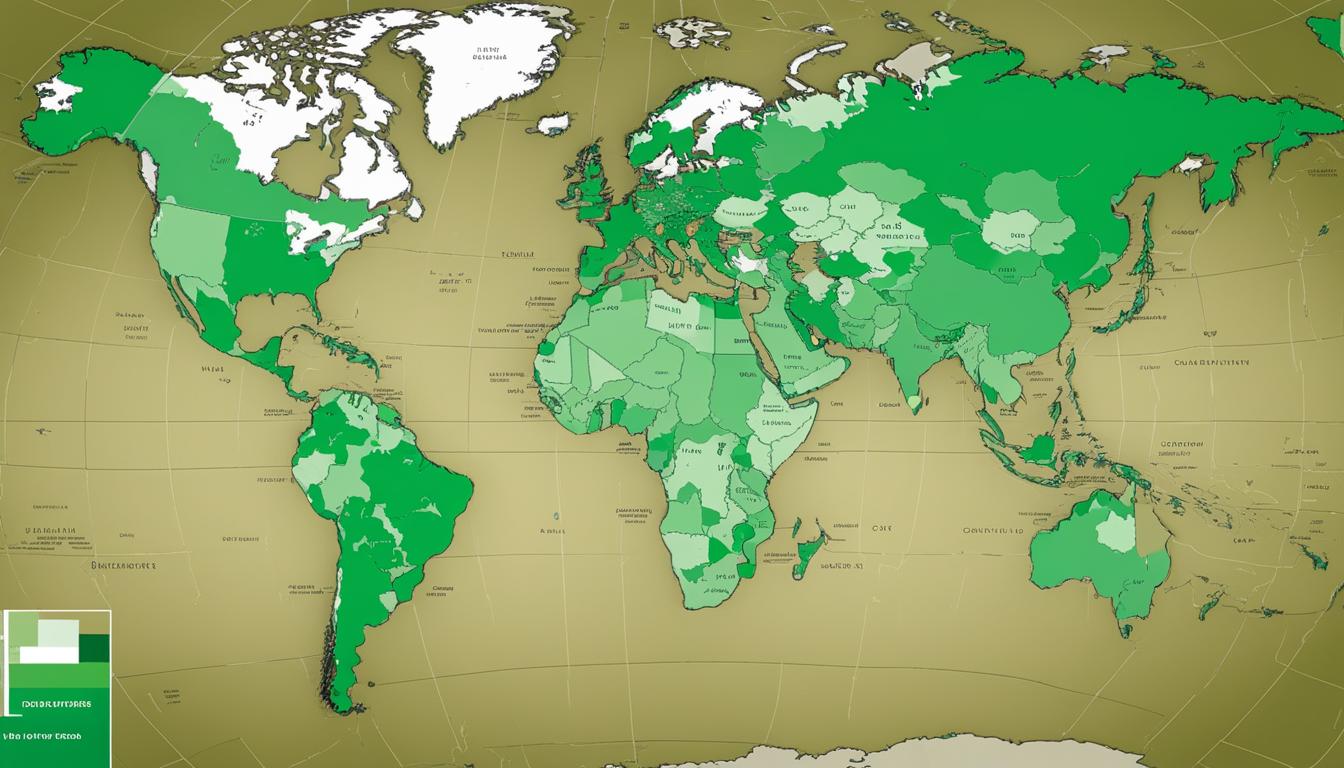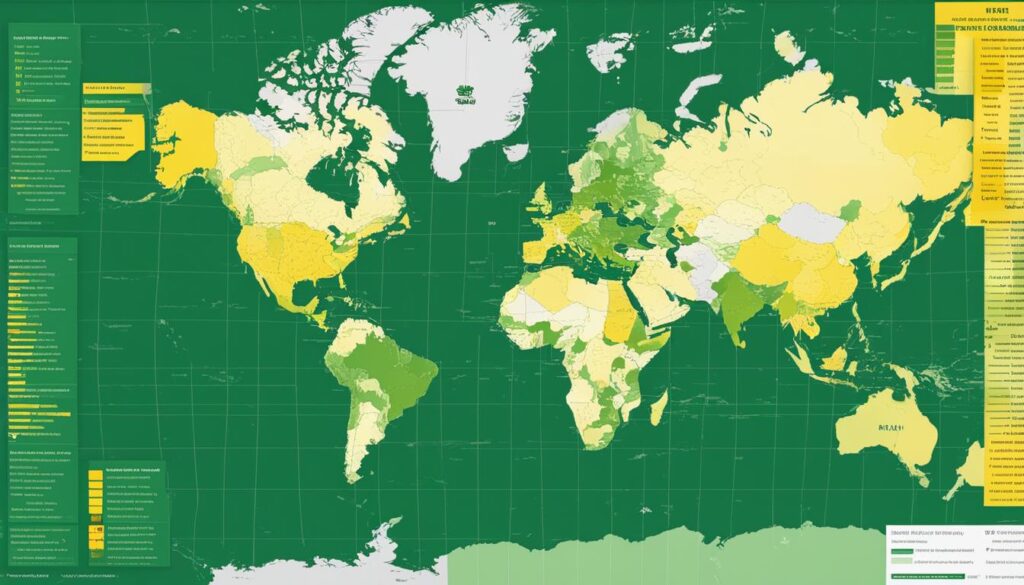Discover What Countries Have Free Healthcare Today!

Are you curious about which countries offer free healthcare to their citizens? In this article, we will explore the list of countries with free healthcare and delve into the difference between free and universal healthcare. So, let’s dive in and find out more!
Key Takeaways:
- Free healthcare is funded through taxes or other means in certain countries.
- Universal healthcare covers a high percentage of citizens or residents in a healthcare system.
- Not all countries provide free healthcare for travelers or foreigners.
- Brazil is the only country with healthcare that is free for everyone, including short-term visitors.
- 43 countries offer free or universal healthcare to at least 90% of their population.
Is Free Healthcare Really Free for Foreigners Abroad?
Free healthcare provided by a government is typically funded by the citizens through taxes or other means. While in some countries with universal healthcare, residents do not receive a bill for healthcare services, they may still incur small fees or deductibles. Visitors and foreigners who are not part of the country’s medical system often have to pay significantly higher costs for healthcare. It’s important to understand that free healthcare does require some form of payment, either through taxes or out-of-pocket expenses.
When traveling abroad, it’s crucial to research and understand the healthcare system of the destination country. In many cases, foreigners may need to purchase private health insurance to ensure coverage while they are overseas. Without appropriate insurance, the costs of medical treatment can be financially burdensome. Additionally, some countries may require visitors to pay upfront for healthcare services and then seek reimbursement from their insurance providers.
Healthcare Costs for Travelers
Healthcare costs for travelers vary widely depending on the country and the specific treatment required. While some countries have reciprocal healthcare agreements with certain nations, providing limited coverage for travelers, this is not the case universally. Without proper insurance, foreigners may be responsible for paying the full cost of medical treatment, which can be exorbitant in some countries. It’s recommended that travelers thoroughly research and understand the healthcare costs and requirements of their destination to avoid unexpected expenses.
Understanding the Difference Between Free and Universal Healthcare
When it comes to healthcare systems, the terms “free healthcare” and “universal healthcare” are often used interchangeably. However, it’s important to understand that they have distinct meanings. Free healthcare refers to healthcare services that are provided to citizens without direct payment. This means that individuals do not have to pay out-of-pocket for the healthcare they receive. Universal healthcare, on the other hand, means that a high percentage of citizens or residents are covered by a healthcare system.
While both free healthcare and universal healthcare are funded through taxes or other means, the level of coverage and the specific services provided may vary. Free healthcare ensures that individuals can access necessary medical treatment without financial burden or barriers. On the other hand, universal healthcare aims to provide coverage for a large percentage of the population, ensuring that healthcare services are accessible to all.
The Difference in Scope
One key difference between free healthcare and universal healthcare is the scope of coverage. Free healthcare focuses on the payment aspect, ensuring that individuals do not have to pay directly for the healthcare services they receive. Universal healthcare, on the other hand, focuses on the extent of coverage, aiming to provide healthcare services to a large portion, if not all, of the population.
While free healthcare may be available to all individuals within a country, universal healthcare goes beyond citizenship and residency status. It aims to include everyone, regardless of their background or financial situation. This broader scope ensures that healthcare services are accessible to the entire population, promoting equity and inclusivity.

Understanding the Key Distinctions
Although free healthcare and universal healthcare are closely related concepts, they have key distinctions. Free healthcare specifically addresses the aspect of payment, ensuring that individuals do not have to bear the financial burden of healthcare services. On the other hand, universal healthcare aims to provide coverage for a large percentage of the population, ensuring that healthcare services are accessible to all, regardless of their ability to pay.
It’s important to note that the implementation of free healthcare and universal healthcare can vary from country to country. Different healthcare systems have different approaches to funding and delivering healthcare services. However, both free healthcare and universal healthcare play crucial roles in ensuring that individuals have access to the healthcare they need without incurring excessive costs or barriers.
Which Types of Health Care Systems Give Free or Universal Healthcare?
When it comes to healthcare systems around the world, there are several different models that countries follow. These models determine how healthcare is funded and delivered to the population. Let’s take a closer look at some of the types of healthcare systems that provide either free or universal healthcare.
The Out-of-Pocket Model
In an out-of-pocket healthcare system, individuals are responsible for paying for their healthcare services directly. This means that patients have to cover the full cost of their medical expenses, whether it’s a doctor’s visit, medication, or hospitalization. This model often leaves people vulnerable to high healthcare costs and can result in limited access to care for those who cannot afford it.
National Health Insurance
National health insurance systems, also known as single-payer systems, are funded by the government through taxes. In this model, everyone contributes to the healthcare system, and the government is responsible for providing healthcare services to the population. Countries like Canada and Australia have national health insurance systems in place, ensuring that their citizens have access to healthcare without the burden of high out-of-pocket costs.
The Bismarck Model and the Beveridge Model
The Bismarck model, named after Germany’s Chancellor Otto von Bismarck, is characterized by mandatory health insurance purchased through regulated providers. This model ensures that everyone has health insurance coverage and can access healthcare services. On the other hand, the Beveridge model, named after the British social reformer William Beveridge, relies on government-owned and operated medical facilities. In this model, healthcare services are provided directly by the government, ensuring access for all citizens.
All of these models represent different approaches to providing healthcare to the population. While some countries offer free healthcare through national health insurance or government-operated facilities, others rely on individuals to pay for their healthcare expenses out of pocket. Understanding these various healthcare systems can give us valuable insights into the different approaches countries take to ensure access to healthcare for their citizens.
Where Can You Find Free Healthcare?
When it comes to free healthcare, one country stands out – Brazil. Brazil offers a publicly funded healthcare system that provides free healthcare to all individuals within the country’s jurisdiction. Whether you are a citizen, a resident, or just a short-term visitor, you can access healthcare services without worrying about out-of-pocket expenses. This universal healthcare system guarantees access to healthcare for everyone, ensuring that no one is left behind in receiving the necessary medical care they need.
Unlike other countries with free or universal healthcare systems, Brazil extends its free healthcare to all individuals, regardless of their citizenship or residency status. This means that even if you are just visiting Brazil for a short period, you can still enjoy the benefits of free healthcare. Whether you need emergency treatment, routine check-ups, or specialized care, the healthcare system in Brazil is designed to cater to the needs of all individuals, ensuring their well-being and providing peace of mind.

Free Healthcare for Everyone
Brazil’s commitment to providing free healthcare for everyone sets it apart from many other countries. While there are countries with universal healthcare systems that offer coverage to a high percentage of their citizens or residents, Brazil goes a step further by extending free healthcare to all individuals, including short-term visitors. This inclusive approach ensures that everyone, regardless of their circumstances, can access the healthcare services they need without financial barriers.
It’s important to note that Brazil is not the only country with a universal healthcare system. Many other countries around the world also provide healthcare that is nearly or completely free for their citizens or residents. However, the level of coverage and the eligibility criteria may differ from country to country. When planning to travel or relocate to a different country, it’s crucial to research and understand the healthcare system in place to ensure you have the necessary coverage and access to healthcare services.
List of Countries With Universal Health Care Systems
Universal healthcare is a reality in many countries around the world. These countries prioritize the well-being of their citizens by providing comprehensive health coverage that extends to nearly 100% of the population. Here is a list of some of the countries that have successfully implemented universal healthcare systems:
1. Canada
Canada’s healthcare system, known as Medicare, ensures that all Canadian residents have access to necessary medical services. The government funds healthcare through taxes and provides coverage for essential services, such as doctor visits and hospital care. While prescription medications and some additional services may require additional costs, Canada’s universal healthcare system is highly regarded.
2. United Kingdom
The United Kingdom’s National Health Service (NHS) is one of the most well-known examples of universal healthcare. It provides free healthcare services to all residents, regardless of their ability to pay. The NHS covers a wide range of medical services, including doctor visits, hospital care, and prescription medications. However, there may be waiting times for non-emergency procedures due to high demand.
3. Germany
Germany operates under the Bismarck model of healthcare, which requires all citizens to have health insurance. The government regulates health insurance providers and ensures that coverage is affordable and accessible to all. German residents have access to comprehensive healthcare services, including doctor visits, hospital care, and prescription drugs.
These are just a few examples of the countries that have successfully implemented universal healthcare systems. Each country may have its own unique approach to funding and delivering healthcare, but the primary goal remains the same – ensuring that all citizens have access to the medical services they need without facing financial hardship.
What Countries Do Not Have Free Healthcare?
While many countries around the world provide free or universal healthcare to their citizens, there are several countries that do not have free healthcare systems in place. One notable example is the United States, which does not have a universal healthcare system. In the US, healthcare is primarily provided through private insurance packages, and individuals are responsible for the costs associated with their medical care.
Other countries that do not offer free healthcare include Nigeria, Yemen, South Africa, Egypt, Afghanistan, Pakistan, and Iran. These countries may have varying healthcare systems, with limitations and additional costs for both residents and visitors. In some cases, government-funded programs may exist to assist certain demographics, such as the disabled or elderly, but overall, healthcare in these countries requires individuals to bear the financial burden.
It’s important to note that the absence of free healthcare does not mean that healthcare services are completely inaccessible in these countries. However, it does mean that individuals and families are responsible for covering the costs of their medical treatment, which can sometimes be prohibitively expensive, especially for those who are uninsured or underinsured.
FAQ
What is free healthcare?
Free healthcare refers to healthcare services that are provided to citizens without direct payment. However, it is important to note that it is funded through taxes or other means.
Is free healthcare truly free?
No, free healthcare is funded through taxes or other means. While residents may not receive a bill for healthcare services, they may still incur small fees or deductibles.
Does free healthcare include foreigners or travelers?
Free healthcare does not necessarily include foreigners or travelers. Different countries have different healthcare systems in place, and while some offer universal healthcare that covers most or all residents, others may have limitations or additional costs for visitors.
What is the difference between free healthcare and universal healthcare?
Free healthcare refers to healthcare services provided to citizens without direct payment, while universal healthcare means a high percentage of citizens or residents are covered. Both systems are funded through taxes or other means, but the level of coverage and specific services provided may vary.
What are the different types of healthcare systems?
There are four basic frameworks for healthcare systems: out-of-pocket, national health insurance, the Bismarck model, and the Beveridge model. Each system operates differently and has varying levels of coverage and funding.
Where can you find free healthcare?
Brazil is the only country that offers free healthcare for everyone, including short-term visitors. Other countries may have restrictions or additional costs for visitors or foreigners.
Which countries have universal healthcare systems?
Albania, Argentina, Australia, Austria, Belgium, Brazil, Canada, China, Costa Rica, Croatia, Cuba, Denmark, Finland, France, Germany, Greece, Iceland, India, Ireland, Italy, Japan, Netherlands, New Zealand, Norway, Portugal, South Korea, Spain, Sweden, Switzerland, Taiwan, and the United Kingdom have universal healthcare systems.
What countries do not have free healthcare?
The United States is the largest country without a universal healthcare system. Other countries without free healthcare include Nigeria, Yemen, South Africa, Egypt, Afghanistan, Pakistan, and Iran.



